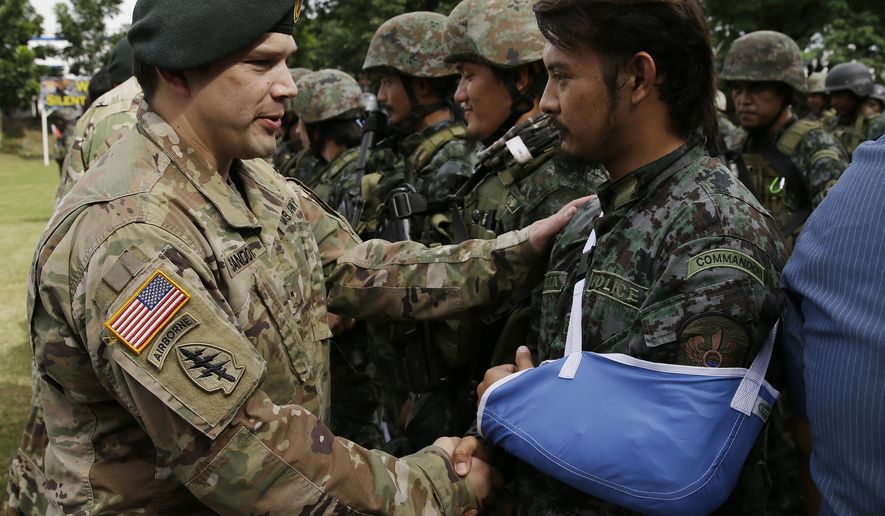Washington will continue to provide American arms, equipment and personnel to support the Philippines’ ongoing war against extremist groups, as Manila continues to battle against Islamic State affiliates looking to gain a foothold in the Pacific nation.
Defense Secretary James Mattis reaffirmed the Pentagon’s support for local counterterrorism operations during meetings with Philippine President Rodrigo Duterte and Secretary of National Defense Delfin Lorenzana this week during meetings with senior defense leaders of the Association of Southeast Asian Nations in Manila.
During his meeting with Mr. Lorenzana, the defense chiefs “discussed the importance of U.S.-Philippines cooperation to defeat violent extremism and terrorism posed from groups like ISIS and address the threat posed by returning foreign fighters,” said Pentagon spokeswoman Dana White, using an acronym for the Islamic State.
The former Marine Corps four-star general also expressed condolences to the families of Philippine fighters killed during Manila’s recent offensive against Islamic State affiliates in the southern city of Marawi.
Philippine forces, with American support, successfully recaptured the city from the Maute Group earlier this month. The Maute Group, a loose affiliation of former Abu Sayyaf militants and other jihadi cells loyal to the Islamic State, captured the city in a bloody takeover in June. The terror group held the city, 64 miles south of the provincial capital of Cagayan de Oro, for five months in tough, street-by-street fighting.
“Their success could not have been achieved without the Armed Forces of the Philippines, who went to extraordinary lengths to safeguard the lives of innocent civilians caught in the conflict or held hostage by ISIS militants,” Mr. Mattis told Mr. Duterte during their meeting, according to the Pentagon.
“The U.S. remains committed to enduring counterterrorism cooperation with the Philippines against this violent terrorist ideology to prevent its adherents from gaining a foothold elsewhere in the Philippines,” he added.
Despite such committments, Mr. Mattis made no mention of re-establishing U.S. special operations task force in the Southern Philippines, in the wake of the Marawi operation. The task force was officially shuttered in 2015. But since then, Washington has continued to funnel weapons and support to the Philippine military.
The Pentagon’s commitment to Manila’s counterterrorism fight is also a far cry from the seemingly adversarial relationship between Washington and the Philippines at the beginning of Mr. Duterte’s term in office.
After winning the presidency on a ultra-nationalistic platform, focusing on domestic security issues, Mr. Duterte was quick to bemoan Manila’s long-standing military relationship with the U.S. That rhetoric quickly cooled once the Maute Group and other Islamic State affiliates began making noise in the southern part of the country.
The Maute Group overran Marawi in July after a failed raid by Philippine military and police on a suspected hideout of Isnilon Hapilon, who had led the al-Qaeda linked Abu Sayyaf terror group before pledging allegiance to ISIS in 2014.
Maute Group’s hold on Mawari was bolstered by an influx of advanced weaponry and combat-hardened Islamic State advisers — mostly from the Middle East and Chechnya — directed into the country by the group’s operational leadership in Syria, analysts say.
But Philippine forces were able to break the Marawi siege earlier this month, in operations that also resulted in the death last week of Mr. Hapilon and and Omar Maute, a top commander of the Islamic State-affiliated terror group bearing his family’s name.
• Carlo Muñoz can be reached at cmunoz@washingtontimes.com.




Please read our comment policy before commenting.